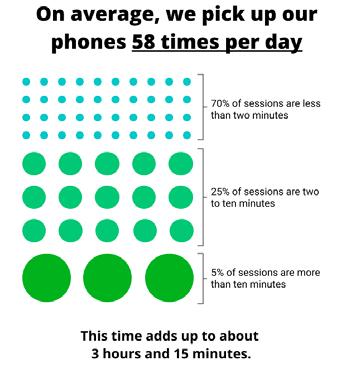
3 minute read
No, you’re probably not ‘addicted’ to your phone , but you may be using it too much
EXTRACURRICULAR
NO, YOU’RE PROBABLY NOT ‘ADDICTED’ TO YOUR PHONE , BUT YOU MAY BE USING IT TOO MUCH
Advertisement
Addiction is a term used to describe people who spend too much time on an activity or on something that is deemed detrimental to their health and wellbeing. From checking our phones repetitively, to playing with specific apps and texting, the modern culprit is excessive smartphone use. So how much is excessive? If you have dined in a busy restaurant and find yourself seated next to a group of friends, you may have noticed throughout your meal that they have spent the whole night hunched over their smartphones. They seem to have a meal together but are apart. This phenomenon is so common now that it even has its own buzzword, called phubbing - the practice of ignoring one’s companions in order to pay attention to one’s phone or other mobile device. In 2021, more than 3.8 million people own smartphones and the average user spends around five hours a day on phone activities. For most people, obsessively checking their phone has become a reinforced behaviour which fortunately could be broken without severe or long-lasting withdrawal effects.
However, a small proportion of people may be more prone to behavioural addictions to their smartphone apps such as online gambling, playing video games continuously and social media browsing. Clinically speaking, you cannot become addicted to a device, but you can develop behavioural addictions to these smartphone functions.
Is Social media to be blamed?
The behavioural impact of the use of smartphones for social media purpose can spans from obsessiveness such as engaging in and checking smartphone apps until they no longer provide a rewarding adrenaline hit, to addiction. The specific functional use of our smartphone is what we need to look more closely at. An average user’s
EXTRACURRICULAR
smartphone activities would be texting, reading social media posts, internet searching, watching videos and phone calls Social media rewards users via ‘likes’, emoji use and social engagement with a large audience. The more people respond to a post, the more we gain a sense of enjoyment that people are validating our thoughts or interests. Sometimes the rewards form a measurement of popularity, thus encouraging people to seek affirmation and acceptance in social settings. Before the rise of Facebook and Instagram, humans sought out one another via many settings for social engagement and social validation. So it’s no surprise that when we have the technology to extend our social connections into wider communities, and we do so without a second thought.
Career adults know they are unable to socialise all the time because of other demands on their time. However, for the younger generation, the social world is their priority, as it influences their identity development and so they seek validation outside friends and family. If you are concerned that you are always on social media, you may ask yourself: what do I gain from posting and replying online? Can I gain the same rewarding benefits from face-to-face social engagements? For some, online engagement diversifies their offline social engagement, while others are unaware that most of their life is now lived online.
Is it time to put your Smartphone down?
Many smartphone users are obsessed with their smartphone functions. But over time, they may find it less interesting and treat it like an engaging gadget or a replacement for a computer. In the meantime, we need to educate today’s young users about problematic internet use and help them understand why using functions on their smartphone can be potentially time-wasting and, at worst, negatively impact their mental wellness. This can be communicated in early childhood and reinforced throughout the developmental stages. As for adult smartphone users, here are a few simple tips for reducing your smartphone use: • Reduce the number of apps on your phone and keep only what you need and use most often.
The fewer the icons on your home screen the better.
• Turn off notifications and set your phone to notify you only for meaningful events to aid in your health and productivity during work hours.
• Do not charge your phone next to your bed at night, as it is tempting to reach for your smartphone first thing upon waking. • Be aware that instead of reaching for your phone during the day when bored, you can try a mindfulness breathing exercise to relax and clear your mind. To read more, go to : https://theconversation. com/no-youre-probably-not-addicted-toyour-smartphone-but-you-might-use-it-toomuch-89853











